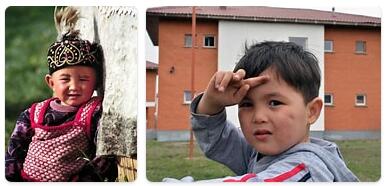Yearbook 2016
Kazakhstan. The low oil prices pushed the country’s economy. Exports, dominated by oil and minerals, had fallen more than 40% in one year and the currency tenge had lost close to half its value against the dollar in six months. President Nursultan Nazarbayev’s authoritarian rule met growing protests. Nazarbayev decided to make progress and announced new elections to Parliament.
Ahead of the March elections, the president pledged $ 1 billion to build affordable housing. He also promised increased investment in infrastructure, agriculture and schools. The regime sought the support of the people for a society without democratic freedoms and rights in exchange for relative economic prosperity.
The current population of Kazakhstan is 18,776,718. The weak opposition in the form of the National Social Democratic Party (NSDP) was allowed to take part in the elections. But before the election, the Anti-Corruption Bureau launched an investigation into the journalist association’s chairman Sejtkazy Matayev, who was accused of theft and tax evasion. Matayev saw the allegations as political and as an attack on freedom of the press. The campaign followed a strike against regime-critical media and political activists.

According to the official results, Nazarbayev’s power party, the Fatherland, won a landslide victory in the election with 82% of the vote. Two support parties, the Communist Party and the bright road, also came in with just over 7%, the threshold to Parliament. The Social Democrats ended up with just over 1% of the vote.
Nazarbayev described the election as a great success for democracy, but according to OSCE observers it was undemocratic.
During the year, it was revealed that the bank Nordea lent the equivalent of SEK 3 billion through a tax haven to a building in Moscow run by an oligarch with ties to the Kazakh dictator Nazarbayev.
In April, Nazarbayev’s regime was challenged by protests that spread to several cities. The protesters turned to a planned reform, where agricultural land could be auctioned off. Locals feared that Chinese would take over the land, and it was suspected that the sale would be plagued by corruption. The protests against land reform also seemed to be a way of expressing general dissatisfaction with the regime. Nazarbayev warned the people of a development like in Ukraine with battles and deaths.
In an unusual remission against his critics, Nazarbayev decided in May to postpone land reform. He criticized his own government for failing to explain the reform and three ministers resigned.
According to thereligionfaqs, Nazarbayev gave orders for monitoring social media used by activists in the wave of protests. The president warned his opponents and threatened with harsh responses to attempts to destabilize the country.
However, new protests broke out in Alma-Ata, the country’s largest city. When further protests were planned, the police arrested a large number of activists and blocked off the squares in larger cities. In Alma-Ata, the riot police chased away the protesters and seized many of them.
In June, armed men attacked the city of Aktobe in the northwest, near the border with the Russian Federation. Six people were killed in three attacks, including against the National Guard’s location. According to authorities, 18 suspected assailants were killed, who were said to be supporters of radical Islamists driven from abroad. The security service identified the Islamic State (IS) as responsible for the attacks. Later, another armed group was arrested, who were reportedly planning new terrorist acts.
After the unrest, Nazarbayev appointed political veteran Adilbek Zhaksybekov to the powerful position of his chief of staff. A number of other changes were made among senior officials.
In July, four people were killed in a new armed act, now in Alma-Ata. Three of the victims were police.
In August, Nazarbayev declared that the disputed land reform would be postponed for five years and that foreign experience should be studied. Later, two civil rights activists were sentenced to five years in prison accused of stirring up social unrest.
A court in August ordered conditional release of regime critic Vladimir Kozlov, who has been imprisoned for nearly five years, accused of participating in a coup attempt against the government. Kozlov denied the charges.
In September, Prime Minister Karim Masimov was allowed to leave his post and was replaced by Deputy Prime Minister Baqytzjan Saghyntajev. Furthermore, Nazarbayev’s daughter Dariga Nazarbayeva was appointed chairman of the Senate’s important committee on foreign, defense and security policy. It was speculated that she was appointed to succeed her father.
In October, journalist chair Matayev was sentenced to six years in prison for embezzlement and tax crimes along with his son, who was sentenced to five years. The trial was described internationally as political and as an attack on freedom of the press. Both convicted denied the charges.